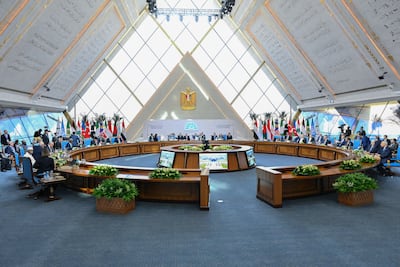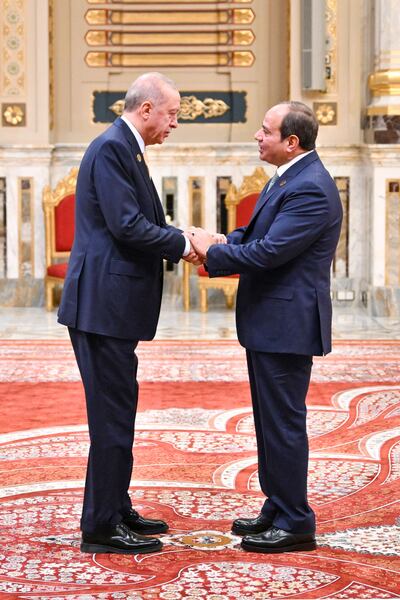Egypt on Thursday hosted the presidents of Turkey and Iran at a summit of eight Muslim-majority countries in its new Administrative Capital where President Abdel Fattah El Sisi met them separately for talks on the turmoil gripping the Middle East since late last year.
The summit of the so-called D-8 nations took place at a time when both Iran and Turkey are involved in the regional upheavals that began with the outbreak of the Gaza war 14 months ago, indicating a growing role by non-Arab nations in the affairs of the region.
Iranian-backed militant group Hamas has been weakened after 14 months of war against Israel in Gaza. Lebanon's Hezbollah, Iran's largest proxy militia in the region, has also been hit hard by Israel before a ceasefire reached late last month stopped their war.
Turkey, meanwhile, is believed to be behind the Islamist-led opposition that toppled Syrian president Bashar Al Assad's regime, which had been propped up by Tehran, Russia and Hezbollah during a 13-year civil war.
“The weight and influence of the Arab Middle East is waning and the centres of power in the region are shifting to non-Arab players like Turkey, Iran and Israel,” said Anis Salem, a retired career diplomat from Egypt who is now with the Egyptian Council for Foreign Affairs, a Cairo think tank.
The summit saw Turkey's President Recep Tayyip Erdogan and Iran's Masoud Pezeshkian meeting for the first time since Mr Al Assad was ousted on December 8.
Mr Pezeshkian, who arrived in Cairo late on Wednesday, is the first Iranian president to visit Egypt since Mahmoud Ahmadinejad, who went in 2013. Iranian Foreign Minister Abbas Araghchi visited Egypt in October, while his Egyptian counterpart, Badr Abdelatty, travelled to Tehran in July to attend Mr Pezeshkian's inauguration.

“The two leaders exchanged views on regional developments and ways to restore peace in the region,” an Egyptian presidential statement said of Mr El Sisi's meeting with Mr Pezeshkian. “The (Egyptian) president emphasised the importance of defusing regional tension and avoiding escalation,” it added without giving details.
The statement made no mention of what sources earlier said was Mr El Sisi's intention to raise the issue of attacks on Red Sea shipping by Houthi forces backed by Tehran when he meets Mr Pezeshkian on the sidelines of the summit.
The Red Sea attacks, launched in solidarity with Palestinians in Gaza, have cut by half Egypt's revenue from the Suez Canal, which links the Red Sea and the Mediterranean and is a major source of foreign currency to the cash-strapped nation of 107 million.
The sources told The National that Egypt has been urging Iran to persuade the Houthis to halt their attacks on shipping but to no avail. Cairo has also been seeking guarantees that the Houthis will not make good on threats to close Bab Al Mandeb, the narrow strait at the southern mouth of the Red Sea.
Egypt and Iran have in recent years held several rounds of consultations to normalise their relations after decades of tension following the 1979 overthrow of the Shah in the Islamic revolution. However, they are yet to upgrade their diplomatic representation to ambassadorial level, reflecting lingering differences.
Cairo has repeatedly called on Iran to stay out of the affairs of Arab nations and stop arming and bankrolling non-state players across the Middle East. Now, Iran's proxies have been considerably weakened, except for the Houthis in Yemen and armed Shiite groups in Iraq.
Underlining the turmoil in the region, the D-8 summit is dedicating a special session to Gaza and Lebanon.

Besides Egypt, Turkey and Iran, the D-8 Organisation for Economic Co-operation includes Nigeria, Pakistan, Bangladesh, Indonesia and Malaysia. Established in 1997, the group aims to foster co-operation among member states.
A separate statement by the Egyptian presidency said Mr El Sisi's meeting with Mr Erdogan reviewed the situation in the region. “The president emphasised the necessity of safeguarding Syria's unity, independence and territorial integrity and the launching of a Syrian political process that brings together all segments of society to achieve national reconciliation.”
Mr Erdogan and the Egyptian leader have jointly masterminded the normalisation of relations between the two regional heavyweights after more than a decade of tension during which Cairo repeatedly accused Ankara of supporting militant groups across the Arab world.
For its part, Turkey was harshly critical of the overthrow in 2013 of Mohammed Morsi, a close Turkey ally whose one year as president in Egypt ended when the military, then led by Mr El Sisi, removed him from power amid street protests against his divisive rule.
The two countries, however, continue to support opposing sides in Libya's long-running conflict between an administration backed by Cairo in the eastern part of Libya and a rival government based in the capital Tripoli in the West. They both support Sudan's army in its 20-month-old civil war against the paramilitary Rapid Support Forces for control of the vast Afro-Arab nation.
Sources briefed on Cairo's relations with Ankara say the two nations, while close trade partners, have also been co-operating on security issues and sharing intelligence since they thawed relations.

